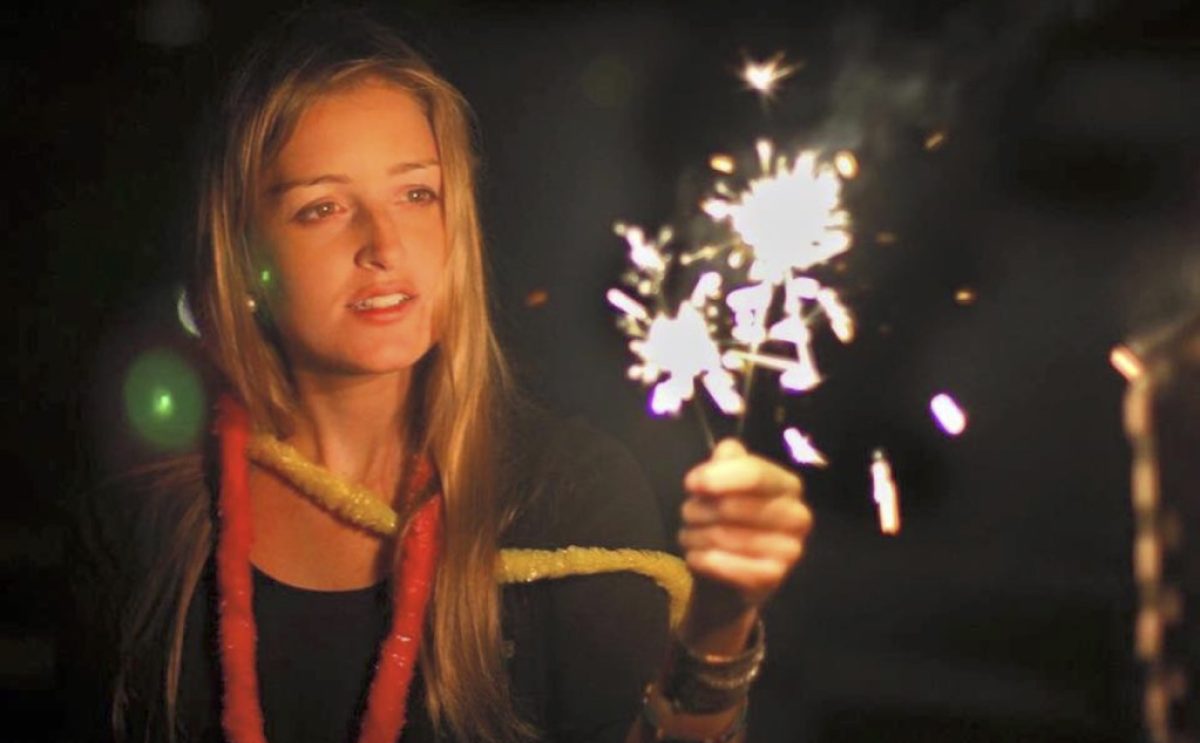We are on Martha’s Vineyard, and today is Caitlin’s birthday. I’m reminded of another birthday of hers spent here, the year she turned 12. It was the terrible year of lung surgeries and months-long inpatient recoveries. But that summer, we received a two-week respite from the hospital, and the respite was spent here. Those weeks return to me in images that feel other-worldly, suspended in time, magical. Riding the Flying Horses carousel in Oak Bluffs, spending hours on State Beach reading The Stone Diaries, a book that would later become a lifelong favorite of Caitlin’s, buying boxes of Murdick’s Fudge. Hearing news of a bombing in Paris that shocked us and caused us to wonder whether life really did unfold for a reason.
Caitlin wrote about that year and its Paris connection in an essay when she was a college sophomore. I’ll let her take over:
My mother bought an Eyewitness Paris guide and pored over the hotel listings with my dad and me. Should we stay in the Latin Quarter or the Marais? For weeks we sat around the dinner table planning our trip. I wrote a list of things I wanted to do in Paris: see the Mona Lisa, have hot chocolate in a sidewalk café. It was September, 1994. I was eleven years old. When I finished sixth grade the following June, we were going to go to Paris.
A month later, a pneumonia landed me in the hospital. Unlike other pulmonary exacerbations I’d had in my life due to my being born with cystic fibrosis, a couple of weeks of IV antibiotics did not get me back on my feet. Instead of getting better, my lung infection got worse and worse, and no one knew why. In November, my doctors at Children’s Hospital performed a bronchoscopy on my lungs to try to see what, exactly, was wrong. By December they had determined that an entire lobe was irreversibly damaged by a stealthy organism that no one had even known I’d cultured. I would have to undergo major surgery to remove the lobe. Surgery was scheduled for my three-week spring break in March.
I didn’t look sick, didn’t feel sick, and therefore, didn’t know enough to be scared. I went to school, played basketball that season, and surgery seemed like one more scheduled appointment that would be hard, but that I would get through. Paris would be the reward at the end.
In early March I was admitted to Children’s Hospital. I knew that my surgeon was considered the best and I completely trusted that he would do his job and I would go back to living my normal life.
I remember waking up in the ICU. It was dark and quiet but much of my memory is clouded by the heavy painkillers I required during those first weeks after the surgery. I heard that everything had gone well. The damaged lobe was gone, but the rest of my lungs were clear and healthy. The chest tubes, which drained leaking fluids from my chest while the lung healed, would stay in for a week or two until the lung repaired itself.
In late March the doctors removed the tubes and sent me home. I’d lost a lot of weight and I was skinny and pale. I went back to school but it was a struggle to regain my former health. A walk up a flight of stairs left me breathless. I didn’t seem to be recovering as easily as everyone had predicted.
Memorial Day weekend arrived. We had plans to visit the family of my best friend in New Hampshire, but my mother noticed I was breathing heavily and called my CF doctor who said to come in right away. We discovered that tiny amounts of air were leaking into my chest, causing a large pneumothorax—to the point where my heart had been squeezed and pushed aside.
My surgeon scheduled another surgery expecting to find something wrong. There was talk of using tissue from my stomach to patch my lung if necessary. I went under anesthesia petrified that I would have another large, hideous scar like the new one on my back. Once inside, the surgeon saw that my lungs were clear and healthy-looking. All he could do, he said, was keep the chest tubes in me and wait for the lung to heal itself.
The chest tubes, being connected to other equipment, kept me confined to my room during all of June and into July. From my 9th floor room, I could see ball games at Fenway Park and one night, Fourth of July fireworks. I began to know nurses by their knock. Junk mail from fast food companies would be delivered to me, in my room. A team made up of specialists from Children’s and the Brigham tried to figure out why I was not healing. No one could come up with a definitive answer. Every few days, the team would check, via x-ray, whether the air was still leaking. It always was.
The trip to Paris was canceled, of course.
As July progressed, the rate at which the air was leaking began to slow, but did not stop. This was the most stressful and depressing of many stressful times in my life. I had not considered myself especially religious but I began to pray constantly. I had one physical therapist who was obviously very spiritual and she was my favorite. All I had time to do was think and I grew up entirely in the course of those two months.
Finally, the decision was made to try to send me home for two weeks, just to give me a mental break. The air was leaking slowly enough so that I wouldn’t be in any danger. When I returned, the chest tubes could be reinserted and the draining and waiting could start again.
We went to Martha’s Vineyard for our break. On July 23, the day we were to have flown to Paris, I felt particularly sad. The Vineyard was beautiful of course, but it felt second-best compared to Paris.
Then on Tuesday, July 25, the news was full of reports of a bombing in Paris. The Saint-Michel train station, next to the hotel where we were to have stayed, had been bombed with explosives and nails packed into a gas bottle. Eight people were killed. Our meticulously-planned itinerary of ten months earlier would have had us in that train station that evening.
Maybe things were happening for a reason.
We left the island and returned to Children’s, fully expecting to hear that the lung was still leaking air. Instead my surgeon entered the room with a thumbs-up. “I don’t understand what happened,” he said, “but the air has stopped.” He warned me not to fly for at least six months, until the lung had completely healed.
Paris didn’t happen for a long time, however. A summer later, the horrific TWA flight 800, en-route-to-Paris crash killed a girl named Caitlin O’Hara who was my exact age, 13. There was her name/my name, in the crash list of victims in the newspaper. People at my boarding school who did not know where I lived assumed I had been the one who died.
I began to feel very superstitious about Paris. I wasn’t meant to go, wasn’t meant to fly there. I got to the point where I no longer even wanted to go. I was too afraid. Much of my life began to be dominated by superstition because of my CF. I’d had such little control over my health, with so many unexpected and bizarre occurrences, that I began to believe in magical thinking. I would wear the same clothes to each doctor’s appointment and eat the same food before each one. Of course it made no difference but I was convinced for a long time that it did.
Years passed. I flew to Ireland to visit my father’s family, flew to the Caribbean, flew to Florida and Arizona and Italy. But I didn’t go to Paris.
In 2003, my best friend was spending the summer studying at Cambridge University. She wanted me to visit when she finished. I was excited to see London—the Tate, the Tate Modern, the British Museum where I could finally see the pediments and friezes from the Parthenon, collected when wealthy British excavators could claim rights to anything in the world. My mother said, “Since you’ll be in London, why not take the Chunnel train to Paris?”
I was tempted. It was the perfect way to see Paris without flying there. I scheduled a course of IV treatment for the first two weeks of August so that I would be able to travel, in optimum health, before I went back to school in the fall. I began to feel dread; I was scared. Could I ever actually get to Paris? I entertained ridiculous thoughts of fluke accidents and health problems in the back of my mind, but I was determined: I got my IV out on a Monday and left Logan airport on a Wednesday.
I still am never able to get on a plane without worrying about that little pocket of air from so many years ago, but fear can be debilitating. I pushed my fears aside and enjoyed London. On our third day we were scheduled to take the Chunnel to Paris. I was exhausted on the three-hour, early morning ride but I was too nervous to sleep. I didn’t share my feelings with my best friend; I was still too superstitious to speak about it. When we arrived a few hours later, Paris didn’t feel real at first. The train station was just another train station. But as we taxied to the hotel through the early and misty morning, I could see how Paris is unlike any other city. Beautiful architecture decorates every block, and just like one would expect, patisseries and boulangeries stand next to lovely little boutiques. Our hotel was like something out of a movie: small, old, and with floor-to-ceiling windows that opened up like doors to look down on the street below. There were long rose-coloured curtains and spindly dark wooden furniture.
Although worn-out, we would only be in Paris for a few days, and decided to start our trip by seeing the Eiffel Tower and the Arc de Triomphe, two typical Parisian tourist sites that one simply must see on a first visit. We boarded the metro and took it to the Charles de Gaulle Etoile stop. Following the signs in the underground tunnels towards the exit, we climbed the stairs disoriented, not knowing where we would be deposited. Then suddenly it was in front of me, more massive than I had ever expected, with a giant French flag hanging down the middle of it, waving in the breeze. We were at the top of the Champs-Elysees, facing the Arc head-on, and I knew then that I had really made it to Paris.
I don’t like to get emotional in front of people, but I choked up. How fitting it was—though I had not realized it when suggesting we go there first—that this small triumph in my life would be marked by this moving piece of architecture, itself a symbol of triumph, on my first visit to the City of Light. I was rejuvenated. Maybe everything does happen for a reason, and inexplicable, fated events take place. Maybe life and magic are one and the same. As we headed off down the Champs-Elysees, I knew I would never give in to superstition again, never let magical thinking paralyze me.
I enjoyed Paris immensely.
–Caitlin
Caitlin would go on to love Paris forever.
She also would forever love the Vineyard. Today we are honoring her birthday here, with a fundraiser for The Caitlin O’Hara Health Clinic, in Oak Bluffs at the Nowhere Art Gallery. The clinic’s construction is almost complete. Now it must be staffed and maintained. She would love that we will all be talking about her today, and especially love that this clinic will save lives. Click here to please help














A great place to spend Caitlin’s birthday. I loved reading her essay..she was wise beyond her years.
Love to you & Nick.
Eileen & Padraig xx
Thinking of you today.
With love,
Elizabeth Merritt